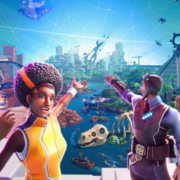Your Guide to the Metaverse
People have no idea what the Metaverse is, so I will be the one to fill you in.
What is the Metaverse? Simply put, the Metaverse is the next mega-phase of the internet, a merging of the physical world with XR, AR, and VR that is just beginning to revolutionize.
It is an extensive online world transcending individual tech platforms, where people exist in immersive, shared virtual spaces. Through avatars, people would be able to try on items available in stores or attend concerts with friends, just as they would offline.
On a recent earnings call, Facebook (FB) CEO Mark Zuckerberg detailed the Metaverse: “It's a virtual environment where you can be present with people in digital spaces,” he said. “You can kind of think about this as an embodied internet that you're inside of rather than just looking at. We believe that this is going to be the successor to the mobile internet.”
Does the Metaverse exist anywhere yet? The answer is yes, early versions of it. The closest approximations of it right now include the likes of digital game platforms Roblox (RBLX) and Fortnite.
The internet era was defined by the computer being in the living room and the connection to the internet being occasional.
The shift to mobile computing is defined by moving the computer from the living room to the office and into your pocket and changing access to the internet from occasional to continuous and persistent.
Metaverse is the idea of computing everywhere, ubiquitous, ambient. In a simplified sense, think about the Metaverse as a series of interconnected and persistent simulations.
One could almost describe it as the next internet, web 3.0.
And crypto, or some sort of crypto offspring or cousin of it, will be the coin of this new realm which is why crypto in its form now is so important.
Consider the internet and mobile internet. Over time it disrupted nearly every industry in nearly every geography.
It changed how consumers patronized, business models, products, behaviors. This produces an extraordinary economic opportunity overall.
The same will happen via the Metaverse.
In the future, instead of just doing calls over a phone call, you’ll be able to sit as a hologram on a couch, or I’ll be able to sit as a hologram on your couch, and it’ll actually feel like we’re in the same place even though it is remote.
Sharing space is what humans perceive as closer to something real.
There’s spatial audio in which distance can change the meaning of a sentence.
This has been in the works for years, ever since Zuckerberg bought Oculus in 2014 and Oculus is effectively the gateway to the Metaverse that Zuckerberg wants to spawn.
Other power Silicon Valley elite are also moving forward into the Metaverse for their own objectives. Microsoft (MSFT) CEO Satya Nadella commented at his earnings call, “As the digital and physical worlds converge, we are leading in a new layer of the infrastructure stack, the enterprise Metaverse."
Many Metaverse believers say the economy of the Metaverse will be larger than that of the physical world.
Personally, I believe it will be 100X larger than the physical world’s economies and much more dynamic.
One of the biggest winners of this Metaverse race will be Epic Games —owner of Fortnite —founded by CEO Tim Sweeney.
Epic released "Fortnite" just five years ago. The game now has 350 million registered players, with anywhere from six to 12 million people playing at any given time.
The Metaverse is a great example of a technology that will likely bring huge benefits to people but there will be unintended, unanticipated costs and harms.
Right now, the Metaverse operates with zero regulations, while its previous iteration, the internet, operates with the least number of regulations out of any major industry in 2021.
The bottom line is that every power Silicon Valley has skin in the game such as Facebook, Apple, Amazon, Microsoft, and Netflix after Epic Games, and they will receive another supercharger to accelerating revenue growth.
The revenue growth in the Metaverse for these companies will make what they earn in the physical world look like a pittance.
We are driving to that point in tech development through hell or high water, and like how every company became a tech company to survive, when the Metaverse and an operable iteration of it become good enough for people to transact smoothly, every company will have to become a Metaverse company or die.
This is the future and it’s creeping closer by the day.




